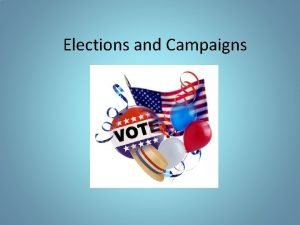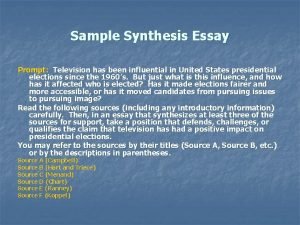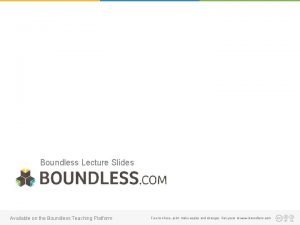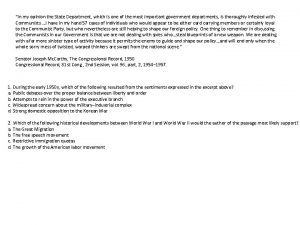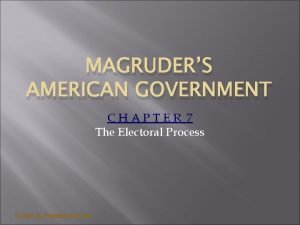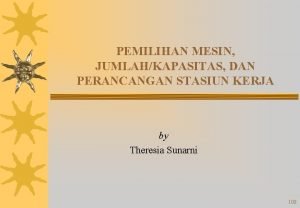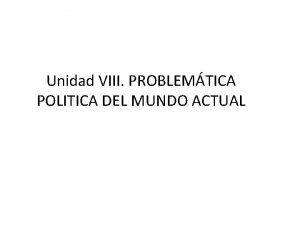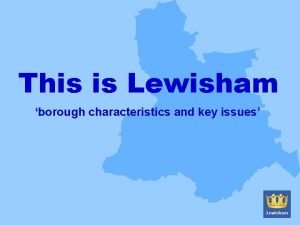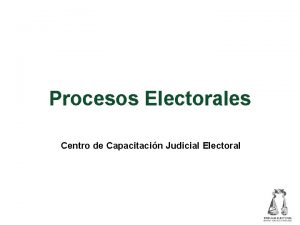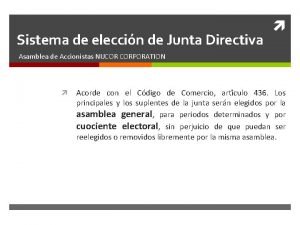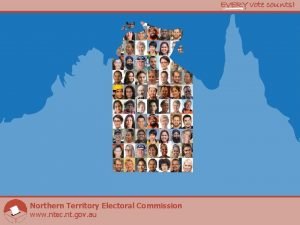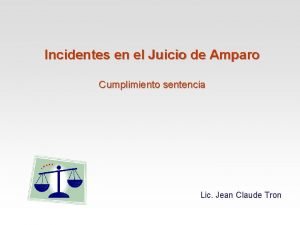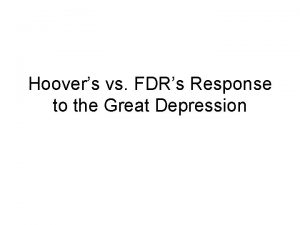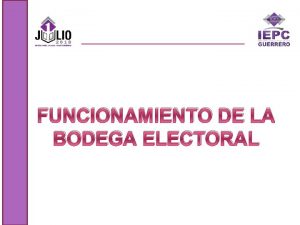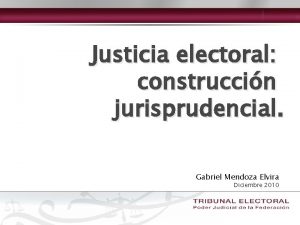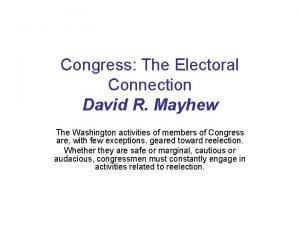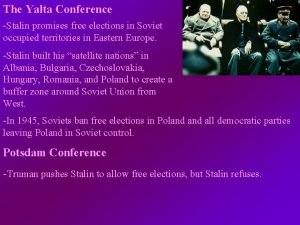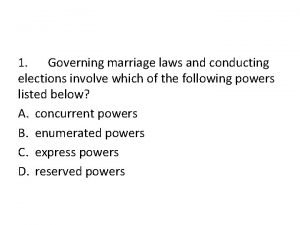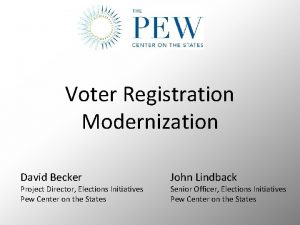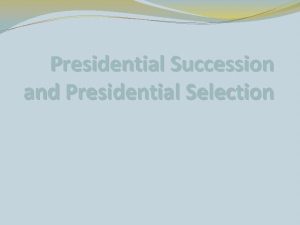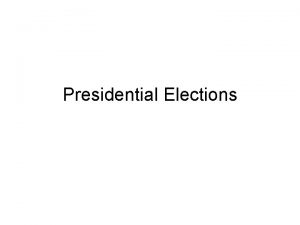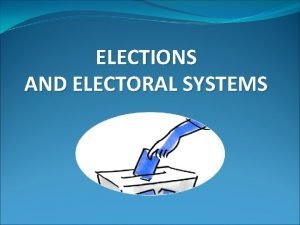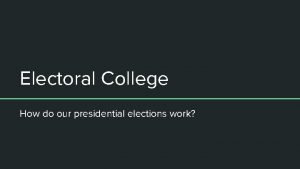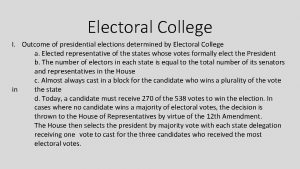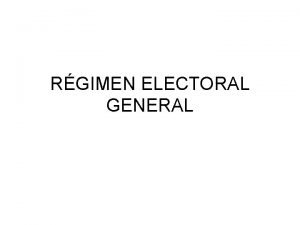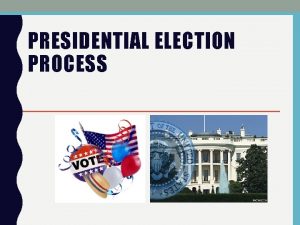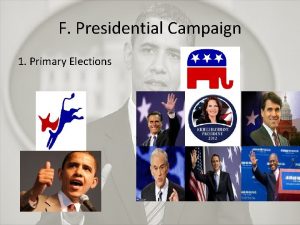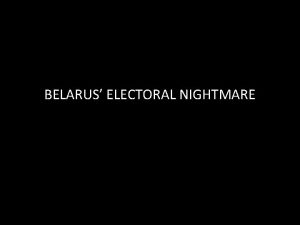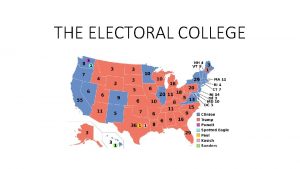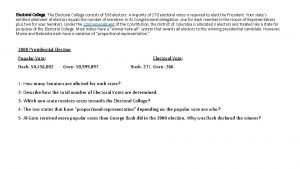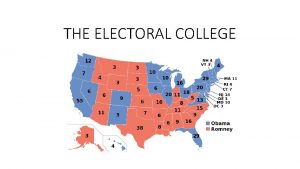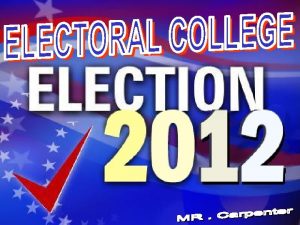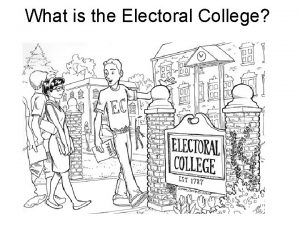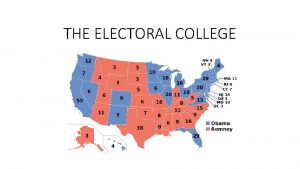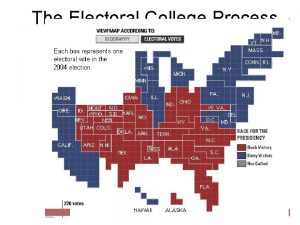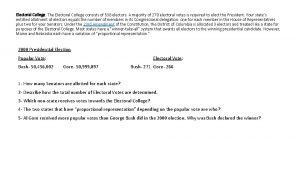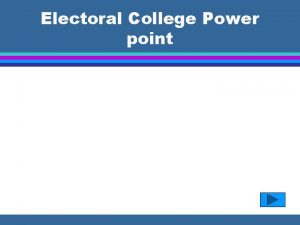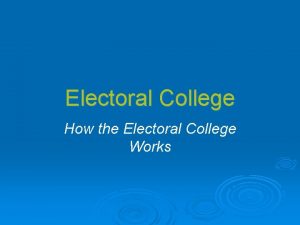The Electoral College Used for presidential elections Framers





![Franklin on the Finished Constitution …[T]here are several parts of this Constitution which I Franklin on the Finished Constitution …[T]here are several parts of this Constitution which I](https://slidetodoc.com/presentation_image_h2/a47acdc7f7bd89d26d9028f6df4c1906/image-6.jpg)

















- Slides: 23

The Electoral College • Used for presidential elections • Framers had concerns that voters wouldn’t make informed decisions • Each state selects electors equal in number to its congressional representation • Electors vote twice: once for president, once for vice president • Political parties have made the Electoral College a “rubber stamp”

The Constitution: Problems Solved • System of checks and balances curbed excessive power by a single branch • Created powerful executive who can veto acts of Congress • Established national judiciary • Different constituencies select members of each branch • Elastic clause allows for expansions to federal authority

Discussion Questions 1. What purpose does the Preamble serve relative to the entire Constitution? 2. What does the supremacy clause provide for? How does it do this? 3. What does the commerce clause allow the federal government to do? How was this an improvement over the Articles of Confederation?

Discussion Questions (cont. ) 4. Why did the Framers include the Electoral College in the Constitution? How did this system originally work? 5. What were some problems of governance under the Articles of Confederation that the Constitution solved?

The Convention Ends Franklin’s concluding speech compared the new nation to the “rising sun” on Washington’s chair • July 1787: Writing began • August: Committee of Style and Arrangement selected • September 17, 1787: Constitution submitted for signing • 39 delegates signed; others refused
![Franklin on the Finished Constitution There are several parts of this Constitution which I Franklin on the Finished Constitution …[T]here are several parts of this Constitution which I](https://slidetodoc.com/presentation_image_h2/a47acdc7f7bd89d26d9028f6df4c1906/image-6.jpg)
Franklin on the Finished Constitution …[T]here are several parts of this Constitution which I do not at present approve, but I am not sure I shall never approve them… I doubt too whether any other Convention we can obtain, may be able to make a better Constitution. . It therefore astonishes me…to find this system approaching so near to perfection as it does; and I think it will astonish our enemies. . .

Ratification Procedure • Addressed in Article VII • Ratification to occur in “special state conventions” • Nine of 13 states needed for ratification • Supporters of the Constitution nicknamed “Federalists” • Opponents called “Anti. Federalists” The first printed copy of the Constitution, 1787

Federalists Hamilton • In favor of ratification • Favored government by “rich and wellborn” • Support concentrated in coastal areas and large cities • Leaders included Hamilton and Madison

Anti-Federalists • Opposed ratification • Tended to be middleclass, farmers, and those who favored civil liberties over a strong government • Included Patrick Henry, George Clinton, Mercy Otis Warren Anti-Federalist leader Patrick Henry refused to attend the Philadelphia Convention, saying he “smelt a rat”

The Ratification Fight • Nine states needed for ratification • Well-organized resistance in NY and VA; RI and NC held convention • Federalists agreed to include statement of civil liberties • NH the ninth state to ratify

The Federalist • Written by Federalists Hamilton, Madison, and Jay • Essays explaining and supporting ratification • Published first in leading newspapers, later in book form • Impact on public opinion debatable

From Federalist #10 A republic, by which I mean a government in which the scheme of representation takes place, opens a different prospect, and promises the cure for which we are seeking. Let us examine the points in which it varies from pure democracy, and we shall comprehend both the nature of the cure and the efficacy which it must derive from the Union… Hence, it clearly appears, that the same advantage which a republic has over a democracy, in controlling the effects of faction, is enjoyed by a large over small republic—is enjoyed by the Union over the States composing it. Does the advantage consist in the substitution of representatives whose enlightened views and virtuous sentiments render them superior to local prejudices and schemes of injustice? It will not be denied that the representation of the Union will be most likely to possess these requisite endowments.

More From Federalist #10 Does it consist in the greater security afforded by a greater variety of parties, against the event of any one party being able to outnumber and oppress the rest? In an equal degree does the increased variety of parties comprised within the Union, increase this security. Does it, in fine, consist in the greater obstacles opposed to the concert and accomplishment of the secret wishes of an unjust and interested majority? Here, again, the extent of the Union gives it the most palpable advantage… In the extent and proper structure of the Union, therefore, we behold a republican remedy for the diseases most incident to republican government. And according to the degree of pleasure and pride we feel in being republicans, ought to be our zeal in cherishing the spirit and supporting the character of Federalists. PUBLIUS

From Federalist #84 “WE, THE PEOPLE of the United States, to secure the blessings of liberty to ourselves and our posterity, do ORDAIN and ESTABLISH this Constitution for the United States of America. ” Here is a better recognition of popular rights, than volumes of those aphorisms which make the principal figure in several of our State bills of rights, and which would sound much better in a treatise of ethics than in a constitution of government. …I go further, and affirm that bills of rights, in the sense and to the extent in which they are contended for, are not only unnecessary in the proposed Constitution, but would even be dangerous. They would contain various exceptions to powers not granted; and, on this very account, would afford a colorable pretext to claim more than were granted. For why declare that things shall not be done which there is no power to do? Why, for instance, should it be said that the liberty of the press shall not be restrained, when no power is given by which restrictions may be imposed?

Opposition Writings • Similar to the writers of The Federalist, some wrote urging rejection of the Constitution: – Letters From the Federal Farmer (Lee and Smith) – Observations on the New Constitution (Warren) – “Objections to This Constitution of Government” (Mason)

From Observations on the New Constitution 2. There is no security in the proffered system, either for the rights of conscience or the liberty of the Press: Despotism usually while it is gaining ground, will suffer men to think, say, or write what they please; but when once established, if it is thought necessary to subserve the purposes, of arbitrary power, the most unjust restrictions may take place in the first instance, and an imprimatur on the Press in the next, may silence the complaints, and forbid the most decent remonstrances of an injured and oppressed people… 14. There is no provision by a bill of rights to guard against the dangerous encroachments of power in too many instances to be named: but I cannot pass over in silence the insecurity in which we are left with regard to warrants unsupported by evidence—the daring experiment of granting writs of assistance in a former arbitrary administration is not yet forgotten in…Massachusetts; nor can we be so ungrateful to the memory of the patriots who counteracted their operation, as so soon after their manly exertions to save us from such a detestable instrument of arbitrary power, to subject ourselves to the insolence of any petty revenue officer to enter our houses, search, insult, and seize at pleasure…

From “Objections to This Constitution of Government” There is no Declaration of Rights, and the laws of the general government being paramount to the laws and constitutions of the several States, the Declarations of Rights in the separate States are no security. Nor are the people secured even in the enjoyment of the benefits of the common law… This government will set out a moderate aristocracy: it is at present impossible to foresee whether it will, in its operation, produce a monarchy, or a corrupt, tyrannical aristocracy; it will most probably vibrate some years between the two, and then terminate in the one or the other… George Mason

Ratification in Virginia • • Crucial to the legitimacy of the new government Henry and Mason led the Anti-Federalists Washington and Madison led the Federalists won after proposing 20 amendments that the legislature would consider after ratification

Ratification in New York • Anti-Federalists believed NY too large to cede authority to a central government • Hamilton’s influence and The Federalist swayed some Anti-Federalists’ opinion • Virginia’s ratification tipped the balance in NY • NC and RI ratified later New York celebrates the ratification of the Constitution

The Bill of Rights • Lack of protection of civil liberties in Constitution hotly debated • Madison given task of writing series of amendments • 12 amendments proposed, 10 ratified • Amendment dealing with congressional pay raises not ratified until 1992

The Bill of Rights: A Summary 1. Freedom of speech, press, religion, assembly, and petition 2. Right to keep and bear arms 3. Conditions for quartering of soldiers 4. Regulation of search and seizure 5. Provisions concerning prosecution 6. Trial by jury and the rights of the accused 7. Right to civil trial by jury 8. No excessive bail or punishments 9. Protection of unenumerated rights 10. Powers reserved to the states or the people

Discussion Questions 1. What system did the Framers devise for ratifying the Constitution? How did this improve upon the Articles’ method? 2. What were some characteristics of the Federalists? The Anti-Federalists? What did opponents of the Constitution dislike the most? 3. How did the Constitution gain ratification in Virginia and New York, despite major objections?

Discussion Questions (cont. ) 4. Who received the task of writing a bill of rights? What sources did he rely on for developing a list of amendments? 5. What four general categories of rights does the Bill of Rights protect?
 Presidential elections exploration and announcement
Presidential elections exploration and announcement Ap lang synthesis essay television presidential elections
Ap lang synthesis essay television presidential elections Electoral college changes
Electoral college changes Compromise
Compromise The 1964 electoral map above illustrates the
The 1964 electoral map above illustrates the Chapter 7 the electoral process
Chapter 7 the electoral process Election machine
Election machine Geografía electoral
Geografía electoral Lewisham council electoral roll
Lewisham council electoral roll Geografía electoral
Geografía electoral Materia electoral
Materia electoral 1992 electoral map
1992 electoral map Ejemplo cuociente electoral junta directiva
Ejemplo cuociente electoral junta directiva Ntec
Ntec Tipos de incidentes en materia electoral
Tipos de incidentes en materia electoral Hoover v. fdr responses to the great depression
Hoover v. fdr responses to the great depression Ipeeg
Ipeeg El flujograma de documentos electorales es
El flujograma de documentos electorales es Justicia electoral mendoza
Justicia electoral mendoza Electoral connection definition
Electoral connection definition Cuerpo electoral significado
Cuerpo electoral significado Stalin promise free elections
Stalin promise free elections Governing marriage laws and conducting elections
Governing marriage laws and conducting elections David becker elections
David becker elections
